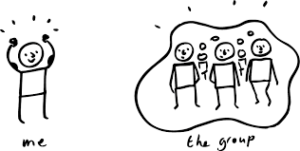More thoughts on Hamilton and Friesen – another attempt at a critique

The Hamilton & Friesen paper, “Online Education: A Science and Technology Studies Perspective” concludes that constructivism as a concept is a useful way of understanding and analysing technologies for learning.
To reach that conclusion, the paper argues that concepts such as essentialism and instrumentalism can limit research into the pedagogical potential of new technologies and that we need more nuanced perspectives, such as constructivism to provide more fruitful new directions.
The article weaves a sophisticated argument about essentialist and instrumentalist perspectives, often recognizing that the two are intertwined. To me, the very fact that the paper presents such a complicated and nuanced stance shows that the interplay of the two concepts is already very useful (and not limiting) in research into the pedagogical potential of new technologies.
Surely it is beneficial to both accept the essentialist view that technological functionality will help the realization of human potential, as well as recognise that technology is a tool to be harnessed. Both concepts are helpful? And, I’d argue that by the very fact that the paper is given up to analysing the two concepts so fundamentally that that is good evidence that they provide fruitful food for thought for future research.
Quotes that stood out:
 I disagree with the idea that as ‘technical capacity for online education develops we will end up with an amorphous global learning structure’. The human desire for individuality will override this. Yes, there is a collectiveness to learning, but there is also an immutable individuality that will remain. The plethora of technical platforms that exist and are being developed is an example of this.
I disagree with the idea that as ‘technical capacity for online education develops we will end up with an amorphous global learning structure’. The human desire for individuality will override this. Yes, there is a collectiveness to learning, but there is also an immutable individuality that will remain. The plethora of technical platforms that exist and are being developed is an example of this.
2. “…it is often the case that new technologies have yielded no significant difference from traditional practices in terms of the enhancement of pedagogical aims, regardless of the underlying pedagogy.”
 It is indeed a paradox that there is so much new technology, yet little change in terms of pedagogical enhancement. An example would be the strategies employed by most educational establishments, whether they be schools or universities, in the last year, to teach their students; video lectures, powerpoints with voice-overs, face-to-face zoom lessons. These seem to be the strategies of choice to deliver lessons. Which seem quite conservative to me. The instrumentalist view is that the educators are using technology as a tool to deliver lessons in as classroom-authentic a way as possible. Is this because traditional pedagogical practices and the attempt to continue them online are perceived to be the best methodologies, or is it because educators need to time and training (and more ideas) to develop different ways of doing it online?
It is indeed a paradox that there is so much new technology, yet little change in terms of pedagogical enhancement. An example would be the strategies employed by most educational establishments, whether they be schools or universities, in the last year, to teach their students; video lectures, powerpoints with voice-overs, face-to-face zoom lessons. These seem to be the strategies of choice to deliver lessons. Which seem quite conservative to me. The instrumentalist view is that the educators are using technology as a tool to deliver lessons in as classroom-authentic a way as possible. Is this because traditional pedagogical practices and the attempt to continue them online are perceived to be the best methodologies, or is it because educators need to time and training (and more ideas) to develop different ways of doing it online?
 3. “… teachers are depicted as conservative, protectionist and hidebound, and their role in the development of online education either downplayed or forgotten.” This essentialist viewpoint is one that was perhaps stereotypical, even a year ago. There is often the perception (in line with the concept of digital natives v immigrants) that teachers are ‘old-school’. Covid-19 has done much to dispel this image. Teachers have been forced, by circumstance, to up their digital game, although, I would argue that many have a taken an instrumentalist stance when forced to switch to online teaching. This ties in with the statement “Instrumentalism thus equates the educational value of technologies with use, rather than attempting to see how pedagogical concerns and considerations might be built into the technology itself at the level of design.”
3. “… teachers are depicted as conservative, protectionist and hidebound, and their role in the development of online education either downplayed or forgotten.” This essentialist viewpoint is one that was perhaps stereotypical, even a year ago. There is often the perception (in line with the concept of digital natives v immigrants) that teachers are ‘old-school’. Covid-19 has done much to dispel this image. Teachers have been forced, by circumstance, to up their digital game, although, I would argue that many have a taken an instrumentalist stance when forced to switch to online teaching. This ties in with the statement “Instrumentalism thus equates the educational value of technologies with use, rather than attempting to see how pedagogical concerns and considerations might be built into the technology itself at the level of design.”
 4. “In online education, for example, it is a matter of great importance, but also some conflict, how decision-making power in the learning process is delegated. Where do we assign functions to the machine and where do these remain with humans?”. This resonates with me. Who makes the decisions? Is it the educators? Or the tech designers? In deciding how the learning process is delegated using technology, do we then have to decide what is important in education? Should technology be helping the sponge-like learner à la John Locke? Or should technology be supporting active discovery, as well as the construction of knowledge? Should this be on an individual basis, as advocated by Piaget, or should technology be facilitating cooperative, communal learning through teamwork and collaboration?
4. “In online education, for example, it is a matter of great importance, but also some conflict, how decision-making power in the learning process is delegated. Where do we assign functions to the machine and where do these remain with humans?”. This resonates with me. Who makes the decisions? Is it the educators? Or the tech designers? In deciding how the learning process is delegated using technology, do we then have to decide what is important in education? Should technology be helping the sponge-like learner à la John Locke? Or should technology be supporting active discovery, as well as the construction of knowledge? Should this be on an individual basis, as advocated by Piaget, or should technology be facilitating cooperative, communal learning through teamwork and collaboration?




This is a really good response to our discussions around the previous posts and addresses key parts of my second comment on your Essentialism, Instrumentalism, Constructivism … post. I particularly like your second point around a certain pedagogical conservatism in education. This would reflect my experience around supporting colleagues with little experience of digital education in the shift to remote teaching where they really struggled to shift away from attempting to replicate the classroom as much as possible – synchronous sessions in 50 minute increments, etc … As you suggest in point 3, this may change with growing familiarity with digital education (and more time to think about, plan and build truly digital courses). Also, your questions in point 4 are important although the question could be reframed as how power is generated in educational settings, how is it used and circulated and what effects might it have on students and teachers?
So, this is a well crafted post with a clear structure, an effective use of quotes and your responses and a good use of images to emphasise the points being made.
Thank you.
I am going to try and link these observations of mine on H&F to the Nesta report and create that as my base for my critique. Whether I manage to find those links will be interesting. I think there is some mileage in considering how far the Nesta report is advocating true co-construction between tecnology and education.
What do you mean by ‘how power is generated in educational settings? Power in terms of decisions made by management teams?
I have re-read my point 4. I was being short-sighted in wondering what role technology should be given to develop educational provision; what I should perhaps have argued is that the beauty of technology is that it is flexible and infinitely malleable. We should be able to use technology to do whatever we want it to do. But, in order to get the most out of the potential of technology within education, we have to remember the pedagogical context in which the technology is going to be used. Do we want it to aid pure knowledge acquisition, or in another lesson, perhaps we want to create a problem-solving scenario, or provide an adaptive platform of learning.